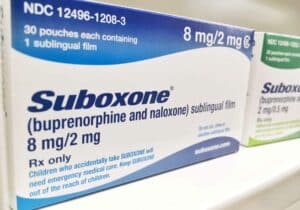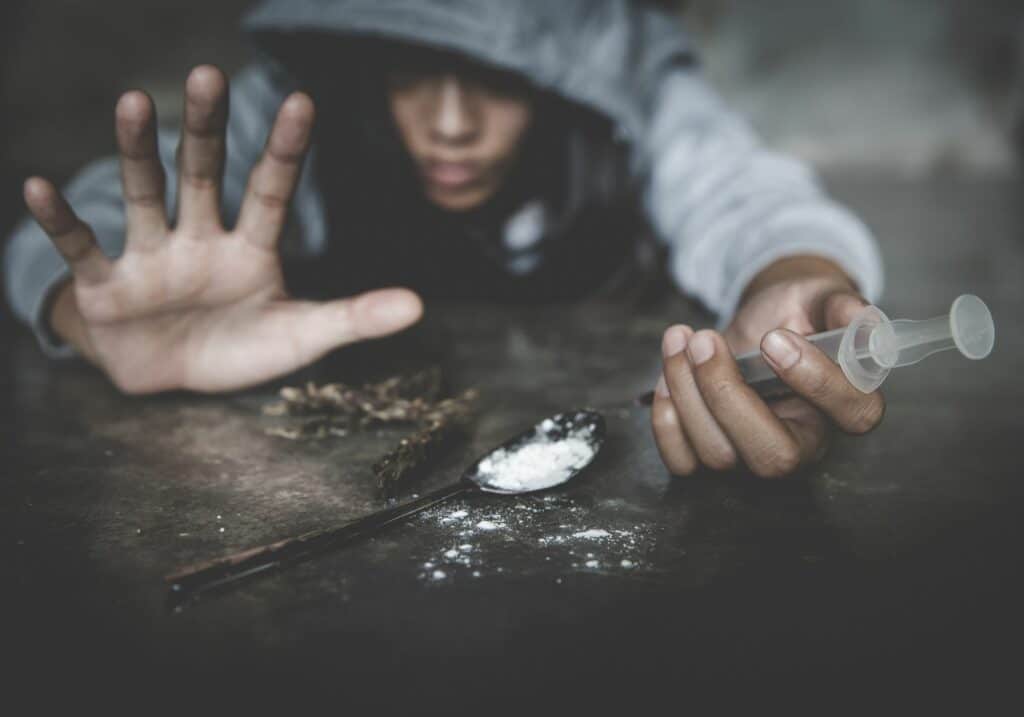What is a Heroin Overdose?
A heroin overdose represents a critical and potentially fatal risk associated with the use of this opioid drug. Overdose occurs when a person consumes heroin in such high doses that their body cannot effectively process the drug, leading to opioid toxicity.
The primary danger of a heroin overdose lies in its impact on the brain’s respiratory centers. High doses of heroin and other opioids can dramatically slow down breathing, a condition known as respiratory depression. If not promptly addressed, this can progress to respiratory arrest and, ultimately, death.
The threat of overdose is compounded when heroin is used alongside other substances like alcohol or benzodiazepines, which can also depress the respiratory system.
Further complicating the issue is the unpredictable purity of illicit heroin. Often, heroin is adulterated with other substances, notably fentanyl, which is a significantly more potent opioid. This adulteration can unexpectedly enhance the drug’s strength, making even small doses extremely dangerous. This variability in heroin’s composition adds a layer of unpredictability and increases the risk of overdose for individuals who believe they are only using heroin.
Timeline for Heroin Overdose
Heroin, an opioid drug with a high potential for addiction, presents significant risks at any level of use. Its addictive nature and the dangers associated with its consumption, including the risk of overdose, are reasons for immediate concern.
The likelihood of experiencing a heroin overdose can be influenced by various factors, including the method of consumption:
- Snorting heroin leads to effects that can be felt in about 60 seconds.
- Intravenous injection results in almost immediate effects, typically within 30 seconds.
- Sub-muscular injections take longer to produce effects, often several minutes.
Following the initial rush of euphoria, users reach what is known as the peak – the point where the effects of heroin are most intensely felt. This peak varies from person to person but generally occurs around ten minutes after taking the drug.
It is during this peak period that the risk of overdosing is highest. The intense influence of heroin at this stage can be overpowering, to the extent that users may not be aware that they are experiencing an overdose. This underscores the critical nature of understanding the dangers of heroin use and the importance of seeking help if you or someone you know is using this drug.
Signs of Heroin Overdose
Heroin overdose is a critical condition that manifests with a range of noticeable symptoms. When someone overdoses on heroin, their body’s blood flow significantly decreases, often leading to visible changes such as bluish discoloration of lips or fingernails. Moments before an overdose, some individuals might experience symptoms like a dry mouth, a sudden drop in blood pressure, or cramps in the intestines.
Signs of heroin overdose include:
- Their pupils become markedly constricted.
- They struggle to maintain posture or cannot stand up.
- Their speech becomes incoherent or slurred.
- They may intermittently lose consciousness or “nod out.”
Another critical symptom of a heroin overdose is respiratory depression, where the individual’s breathing becomes labored and shallow, often with a raspy or hoarse sound. Their pulse may also become faint or irregular. In severe cases, the person may lose consciousness or slip into a coma, posing a significant risk of death.
It’s imperative to recognize these signs promptly and seek immediate medical assistance, as a heroin overdose requires urgent intervention to prevent fatal outcomes.
Symptoms of Heroin Overdose
Heroin overdose is a serious medical emergency characterized by a set of specific symptoms, often including what medical professionals call the opioid overdose triad. This triad consists of three key signs: severe respiratory depression, a significantly decreased level of consciousness, and pinpoint pupils.
In addition to these core symptoms, a heroin overdose can manifest in various other ways, each indicating the urgent need for medical attention. These symptoms include:
- Uncontrollable vomiting, a reaction to the body’s response to the drug.
- Profound drowsiness and lethargy, making the person appear extremely sleepy or unresponsive.
- A limp body, indicating a loss of muscle control.
- Inability to wake up, even in response to painful stimuli, such as sternum rubs.
- Choking or gurgling sounds, which may indicate airway obstruction.
- Shallow, strained, or labored breathing, a sign of respiratory distress.
- A slow pulse, reflecting the drug’s impact on the heart rate.
- Low blood pressure, a common occurrence in overdose situations.
- Skin that appears pale, blue, clammy, and/or cold, indicating poor circulation and oxygenation.
- Total cessation of breathing (respiratory arrest), the most critical and life-threatening symptom of a heroin overdose.
Recognizing these symptoms promptly is crucial, as immediate medical intervention can be life-saving in the event of a heroin overdose. If you suspect someone is experiencing a heroin overdose, it’s essential to seek emergency medical assistance without delay.
Heroin Overdose Causes & Risk Factors
Heroin overdoses can tragically occur in various situations, even with first-time users. There are specific demographics and conditions that heighten the risk of experiencing a heroin overdose. These risk factors include:
- Young Adults: Individuals aged between 20 and 40 years old are at a higher risk.
- Gender: Male users tend to have a higher incidence of heroin overdoses.
- History of Overdoses: Those who have previously overdosed on heroin or other opioids.
- Coexisting Health Conditions: Severe medical or mental health issues, such as depression, HIV, respiratory problems, and liver or kidney diseases, amplify the risk.
- Intravenous Use: Injecting heroin directly into the bloodstream increases the likelihood of overdose.
- Escalating Dosages: Gradually increasing heroin consumption can lead to overdose.
- Reduced Tolerance: Overdosing becomes more probable when using heroin after a period of abstinence, during which opioid tolerance diminishes.
- Polysubstance Use: The risk escalates significantly when heroin is used in combination with other substances, particularly other central nervous system depressants like alcohol or benzodiazepines. These combinations can intensify the respiratory depression that often accompanies opioid overdoses.
It’s worth noting that the majority of heroin users also consume other substances, which can compound the risk of overdose. The danger is especially acute when heroin is mixed with substances that further suppress the central nervous system, increasing the potential for fatal respiratory slowing. Understanding these risk factors is crucial in both preventing heroin overdoses and in providing timely and effective interventions when they do occur.
Responding to a Heroin Overdose
In the event of a heroin overdose, prompt action is crucial. The symptoms can rapidly escalate to life-threatening levels, making it imperative to respond quickly and effectively.
- Call Emergency Services: The very first thing you should do is dial 911. Time is of the essence in these situations, and professional medical help is essential. When you call, be prepared to give clear information, including your location and the substance involved, to expedite the arrival of emergency responders.
- Administer Naloxone if Available: If you have naloxone (commonly known by its brand name, Narcan) and are trained in its use, administer it immediately. Naloxone is an opioid antagonist and can temporarily reverse the effects of a heroin overdose. It’s important to remember, though, that the effect of naloxone is temporary, lasting only about an hour.
- Seek Immediate Medical Attention: Even after administering naloxone, it’s critical to seek professional medical help. The effects of a heroin overdose can be complex and require medical expertise for comprehensive treatment.
The quick and decisive response in the event of a heroin overdose can make a significant difference, potentially saving a life. It’s essential to remain calm, act swiftly, and ensure that the individual receives the necessary medical attention as soon as possible.
Heroin Overdose Treatment
When an individual arrives in the emergency room due to a heroin overdose, medical staff prioritize stabilizing the patient’s condition. The first critical action involves ensuring adequate breathing. For patients who have difficulty breathing, airway management and ventilation support are key to maintaining proper oxygen levels. Additionally, blood tests are often conducted to detect other substances in the patient’s system and to identify any concurrent health issues.
In cases where naloxone, an opioid antagonist, has been previously administered, its effects may wear off, potentially leading to the reemergence of overdose symptoms. Under these circumstances, additional doses of naloxone may be necessary. After the overdose symptoms subside, patients are typically monitored in the hospital for 6-12 hours or more, depending on the need for stable vital signs maintenance.
Administering naloxone to someone with physical opioid dependence can trigger immediate heroin withdrawal symptoms. These symptoms can range from physical discomfort to emotional agitation, as individuals may undergo a spectrum of emotions, such as anger, embarrassment, guilt, and gratitude, all at once. During these moments, the presence and support of family and friends can be invaluable.
This critical juncture also presents an opportunity for healthcare professionals to discuss heroin addiction treatment options. Such discussions can pave the way for addressing not just the immediate medical crisis but also the broader behavioral and social challenges associated with heroin and opioid use disorders.
Heroin Overdose Treatment at Iris Wellness Group
Iris Wellness Group is a haven for those fighting heroin addiction in Chattanooga, TN. Our heroin addiction treatment center offer a nurturing environment conducive to recovery.
Our compassionate heroin outpatient program offers top-tier medical outpatient heroin detox in Chattanooga, TN, ensuring a safe and effective detox process. Once free from addictive substances, you can seamlessly transition into one of our specialized outpatient treatment programs at Iris Wellness Group, designed to address substance use disorders:
- Outpatient Detox: Combines the convenience of living at home with the effectiveness of regular treatment sessions, ideal for integrating recovery with your everyday life.
- Outpatient Rehab: This program is really flexible, designed to work around your daily schedule.
- Partial Hospitalization Program (PHP): It’s structured but you don’t have to stay overnight. It’s like getting intensive treatment during the day while you live at home.
- Intensive Outpatient Program (IOP): This one offers deeper, more focused care but still lets you keep up with your everyday responsibilities.
- Dual Diagnosis Treatment Program: This is specially for people who are dealing with both addiction and mental health issues at the same time.
Our heroin treatment programs incorporate a variety of interventions:
- Medication-Assisted Treatment (MAT): This uses medicines to help reduce heroin withdrawal symptoms and the urge to use opioids.
- Psychotherapy: This is all about tackling the mental and emotional factors that play a part in addiction by using CBT or DBT.
- Group Therapy: Here, you’ll get support and learn with others who are going through similar experiences.
- Individual Therapy: You’ll get one-on-one support that’s tailored just for you.
- Family Therapy: This helps fix and strengthen your relationships with family, which is super important.
- Holistic Therapies: These focus on improving your overall health – body, mind, and spirit.
- Aftercare: We’ll keep supporting you even after your treatment is over.
Begin your path to recovery with Iris Wellness Group. Our experienced team is here to guide and support you. For more information or to start opioid addiction treatment, reach out to our admissions team at 423-441-4650.












